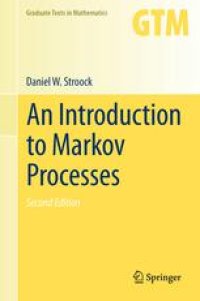
Ebook: An Introduction to Markov Processes
Author: Daniel W. Stroock (auth.)
- Tags: Probability Theory and Stochastic Processes, Dynamical Systems and Ergodic Theory
- Series: Graduate Texts in Mathematics 230
- Year: 2014
- Publisher: Springer-Verlag Berlin Heidelberg
- Edition: 2
- Language: English
- pdf
This book provides a rigorous but elementary introduction to the theory of Markov Processes on a countable state space. It should be accessible to students with a solid undergraduate background in mathematics, including students from engineering, economics, physics, and biology. Topics covered are: Doeblin's theory, general ergodic properties, and continuous time processes. Applications are dispersed throughout the book. In addition, a whole chapter is devoted to reversible processes and the use of their associated Dirichlet forms to estimate the rate of convergence to equilibrium. These results are then applied to the analysis of the Metropolis (a.k.a simulated annealing) algorithm.
The corrected and enlarged 2nd edition contains a new chapter in which the author develops computational methods for Markov chains on a finite state space. Most intriguing is the section with a new technique for computing stationary measures, which is applied to derivations of Wilson's algorithm and Kirchoff's formula for spanning trees in a connected graph.
This book provides a rigorous but elementary introduction to the theory of Markov Processes on a countable state space. It should be accessible to students with a solid undergraduate background in mathematics, including students from engineering, economics, physics, and biology. Topics covered are: Doeblin's theory, general ergodic properties, and continuous time processes. Applications are dispersed throughout the book. In addition, a whole chapter is devoted to reversible processes and the use of their associated Dirichlet forms to estimate the rate of convergence to equilibrium. These results are then applied to the analysis of the Metropolis (a.k.a simulated annealing) algorithm.
The corrected and enlarged 2nd edition contains a new chapter in which the author develops computational methods for Markov chains on a finite state space. Most intriguing is the section with a new technique for computing stationary measures, which is applied to derivations of Wilson's algorithm and Kirchoff's formula for spanning trees in a connected graph.